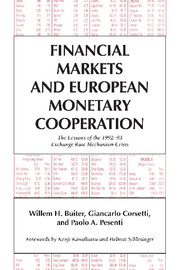 Financial Markets and European Monetary Cooperation
Financial Markets and European Monetary Cooperation Book contents
- Frontmatter
- Contents
- Forewords by Kenji Kawakatsu and Helmut Schlesinger
- Acknowledgments
- 1 Introduction
- 2 Exchange rate stability in Europe: A historical perspective
- 3 The unfolding of the 1992–93 ERM crisis
- 4 Financial markets and ERM credibility
- 5 Modelling currency crises
- 6 A Center–Periphery model
- 7 Unilateral pegs and escape clauses: The role of domestic credibility
- 8 Policy coordination and currency crises
- 9 What caused the system to crumble?
- 10 Rebuilding the system: What next?
- References
- Index
8 - Policy coordination and currency crises
Published online by Cambridge University Press: 06 July 2010
- Frontmatter
- Contents
- Forewords by Kenji Kawakatsu and Helmut Schlesinger
- Acknowledgments
- 1 Introduction
- 2 Exchange rate stability in Europe: A historical perspective
- 3 The unfolding of the 1992–93 ERM crisis
- 4 Financial markets and ERM credibility
- 5 Modelling currency crises
- 6 A Center–Periphery model
- 7 Unilateral pegs and escape clauses: The role of domestic credibility
- 8 Policy coordination and currency crises
- 9 What caused the system to crumble?
- 10 Rebuilding the system: What next?
- References
- Index
Summary
Introduction
In our view, most readings of the 1992–93 events miss the following crucial element: the ERM crackup has been the crisis of an exchange rate system, rather than the collapse of a collection of unilateral pegs individually pursued by a number of countries. The thesis we develop in this chapter is that the conclusions reached within the conceptual framework of the “unilateral peg” may be incomplete or misleading, since they both ignore the key role played by structural policy spillovers among European countries and overlook the effects of coordination (or lack thereof) of monetary and exchange rate policies within the system.
In this chapter and the next we argue that, while domestic private–public sector interactions are certainly an important part of the process that brought down the ERM, the 1992–93 crisis was in the first instance a conflict among monetary authorities and a failure of the European system as a policy coordination mechanism. In contrast to an approach that focuses exclusively on country-specific issues, ultimately only a systemic view is able to provide a comprehensive reading of the ERM crisis.
Our analysis thus fits the category of “fundamental” explanations, provided the set of fundamentals is augmented to include the cooperative (or noncooperative) design of monetary and exchange rate policies in the system, that is, to include the “rules of the game” that characterize the behavior of the Periphery countries and the Center vis-à-vis each other.
- Type
- Chapter
- Information
- Financial Markets and European Monetary CooperationThe Lessons of the 1992–93 Exchange Rate Mechanism Crisis, pp. 134 - 162Publisher: Cambridge University PressPrint publication year: 1998
